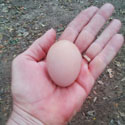
A hen can stop laying eggs for any number of reasons. At the top of the list is the fall molt. As winter approaches, chickens shed their worn feathers and grow a set of new plumage to better keep them warm through cold weather. During the molt, all hens slow down in production, and some stop laying altogether.
The approach of winter also means day lengths decrease. When the number of daylight hours falls below 14, hens may stop laying until spring.
Augmenting daylight with one 40-watt light bulb per 100 square feet of coop space will encourage hens to keep laying through the winter. Turn on the light in the early morning hours so hens awaken naturally; adding light in the evening runs the risk that the coop will get dark before the hens go to roost, causing them the stress of sleeping on the floor. An automatic timer is handy for maintaining consistent light and dark hours. If the light is turned on and off manually, and you inadvertently miss a day or two, hens will stop laying.
The older a hen gets, the fewer eggs she lays, and at some point she may simply stop laying. Most hens lay best during their first year, although a really good layer should do well for two years, or even three. As backyard hens age, they tend to get fat—especially when fed too many treats by a well-meaning keeper—significantly impairing their ability to lay.
This brings up the point that improper nutrition, in general, can cause a drop in laying. Hens that are fed too little or are fed rations containing an improper balance of nutrients will have a hard time sustaining their body functions while laying eggs. Even a hen fed a fully balanced layer ration may have an imbalanced diet from eating too much scratch or from not having free-choice access to a calcium supplement.
Excessive stress can cause hens to eat less than usual, which in turn causes them to lay less than usual. Stress may occur when too many chickens are crowded into too small a coop, when a flock is stalked by predators or tormented by household pets or noisy children, when the chickens are moved or otherwise handled more than usual, or when the weather becomes extremely hot or extremely cold.
A calm, comfortable environment goes a long way toward keeping those eggs rolling in.
Insufficient drinking water can discourage eating and cause a slump in egg laying, so make sure to provide fresh clean water at all times. Hens will drink more during hot weather when offered cool drinking water, and conversely will drink more in cold weather when offered warm drinking water.
Often the too-few-eggs syndrome is simply a matter of hens hiding their eggs. This problem is especially common when hens free-range where they have shrubs to nest under or tall weeds to hide their eggs in. Providing a sufficient number of properly-placed nests will encourage your hens to lay eggs where you can find them.
Consider the possibility that your hens may be eating their own eggs.
Egg eating, a form of cannibalism, is a management problem that usually starts when an egg gets broken in the nest. Broken eggs may result from not providing enough nests or using insufficient nesting material.
An egg eater won’t necessarily come from within your flock. It may be a wily predator, such as a snake, rat, ground squirrel or other wildlife that likes eggs as much as you do. Catching such a critter in the act requires vigilance.
If you can find no other reason for a slump in laying, consider the possibility that your hens are coming down with a disease or are suffering from internal parasites (worms) or external parasites (lice or mites). Reduced laying is often the first general sign of disease. Watch for these additional signs: depression, listlessness, loss of appetite, and weight loss. An ailing hen lays fewer eggs, perhaps of irregular shape, with thinner, paler shells and watery whites.
Regular coop cleaning, proper nutrition, plenty of clean drinking water—along with ready access to fresh air and sunshine—go a long way toward keeping your hens healthy and happy. They will thank you by continuing to lay those delicious eggs you prize them for.
And that’s today’s news from the Cackle Coop.
Gail Damerow, author, Storey’s Guide to Raising Chickens.


